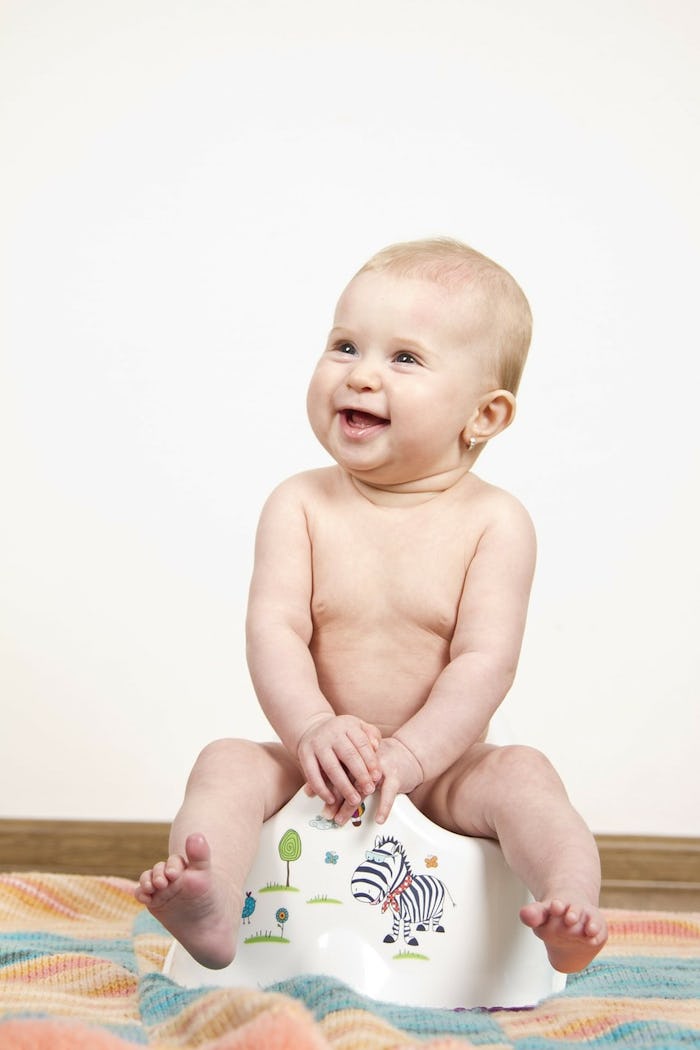Perhaps the only time more exciting than when your child finally sleeps through the night is when you're done with diapers. Potty training is a milestone many parents are eager to reach, and it's not surprising either. Have you ever changed a diaper after your kid just ate some poop-making food? It's not pretty. Sure, with potty training you still have to wash out the occasional potty, but that's a trade most are happy to make. Traditionally, women have been tasked with post-diaper duty, but there are plenty of ways dads can and should help with potty training.
My husband and I have a son and I grew up with a sister, so my experience when it comes to helping males successfully pee into the toilet is pretty much limited to when I was the designated driver in college. Despite my lack of (useful) experience, I was determined to give it my best go. But I was not prepared for the fact that my son, now 2-years-old, would turn aiming into a sport. Sometimes it's like archery, other times it's more like an odd ballet full of interpretive movements. That's why it was so helpful to have my partner just as invested in the process. So check out these ways dads can help out with potty training.
1Show & Tell
This one is mostly specific to boys, but the underlying point is universally applicable. "Boys take a bit longer to toilet train mostly because it’s mom who’s doing all the training," according to Project Potty Training. "Sometimes it’s important for a boy to have their dad show him how it’s done." After all, they're working with the same parts.
2Talk About It
Perhaps one of the biggest challenges you and your partner will face during this processs is being able to remain on the same page about things. Dr. Jan Faull, a parenting expert, told Pull-Ups that in potty training, "communication is key. Talk each day about your child's successes and setbacks with your partner so the potty training approach stays consistent."
3Remember There's No "Winner"
My partner and I often get caught up in this one. When your child is going through a particularly challenging period where they're resisting potty training, it can become easy to start seeing the process as a race that needs to be finished. Take a step back and remind your partner that potty training, just like many developmental mile markers in childhood, aren't about who did it the fastest and when. Trust me, it eases the tension for everyone involved when you approach it with a different mind frame.
4Utalize Rewards
According to potty training experts Caroline Fertleman and Simon Cove, they suggested to Parents that when a child's whole village (parents, teachers, sitters, family, etc.) offers praise and support, potty training will hold more value to the child and thus becomes easier.
5Get Creative
Even the most easy-going tot won't learn how to use the toilet overnight. So it can be tiring when the job of keeping potty training fun and interesting for the child falls to one parent. According to The Baby Center, creativity is key in potty training. Whether it's using food dye to make the toilet colorful or using cereal for target practice, keeping your child engaged is important. And it's easier to come up with ideas when Dad is involved, too.
6Give It A Name
Just like adults, children learn by practicing and hearing information repeated to them. That's why fathers are so integral to the process. If your child hears the same dialogue from both parents, they'll catch on quicker. It can be confusing if you and your partner are using different words for the toilet, pee, or poo. According to the Mayo Clinic, "using simple, correct terms can help your child understand how to talk about the bathroom."
7Give You A Break
There's a reason people take shifts watching from the guard towers on The Walking Dead. They need to be alert and focused, and that won't happen if it's left to just one person. The same goes for potty training. According to What To Expect: The Toddler Years, "you might be better at detecting your child's body signals than they are. Look for signs and ask when you suspect they have to go." So if your partner can be an additional set of eyes and ears, the greater your chances are of catching every potty opportunity.
